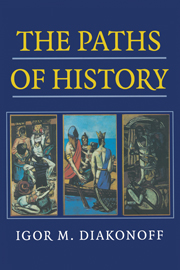Book contents
- Frontmatter
- Contents
- Foreword by Geoffrey Hoskins
- Preface
- Introduction
- 1 First Phase (Primitive)
- 2 Second Phase (Primitive Communal)
- 3 Third Phase (Early Antiquity)
- 4 Fourth Phase (Imperial Antiquity)
- 5 Fifth Phase (the Middle Ages)
- 6 Sixth Phase (the Stable Absolutist Post-Medieval Phase)
- 7 Seventh Phase (Capitalist)
- 8 Eighth Phase (Post-Capitalist)
- Index
Introduction
Published online by Cambridge University Press: 02 December 2009
- Frontmatter
- Contents
- Foreword by Geoffrey Hoskins
- Preface
- Introduction
- 1 First Phase (Primitive)
- 2 Second Phase (Primitive Communal)
- 3 Third Phase (Early Antiquity)
- 4 Fourth Phase (Imperial Antiquity)
- 5 Fifth Phase (the Middle Ages)
- 6 Sixth Phase (the Stable Absolutist Post-Medieval Phase)
- 7 Seventh Phase (Capitalist)
- 8 Eighth Phase (Post-Capitalist)
- Index
Summary
Ahi quanto a dir qual'era e cosa dura Questa selva selvaggia ed aspra e forte Che nel pensier rinnuova la paura.
DanteEvery science is cognition of a process or movement. A natural process usually has clear-cut phases of development, and may be oscillatory or variative, though delimited by certain physically conditioned constants and natural laws. Most processes do not develop in isolation but interact with others, thus causing apparent irregularities. One such process concerns the existence of the species Homo Sapiens. The task of a theoretically minded historian is to find out the common laws and regularities, as well as the causes and the phases of the process in question. We should also try to find the causes of deviations, and the origin of the particular forms of existence of the Homo resulting from the general laws.
The process of the history of mankind can best be likened to the flow of a river. It has a source; at the beginning it is no more than a brook, then come broader reaches; stagnant backwaters and off-shoots, rapids and waterfalls may occur. The flow of the river cannot be completely accidental but it is conditioned by many factors. These are not only the general laws of gravitation and molecular physics but also the particular qualities of its banks which differ in their chemical composition and geological structure; the configuration of its bends, which is conditioned by the soil and the environment; one current overlaps with other currents, and they carry different organic and non-organic admixtures.
Information
- Type
- Chapter
- Information
- The Paths of History , pp. 1 - 9Publisher: Cambridge University PressPrint publication year: 1999
